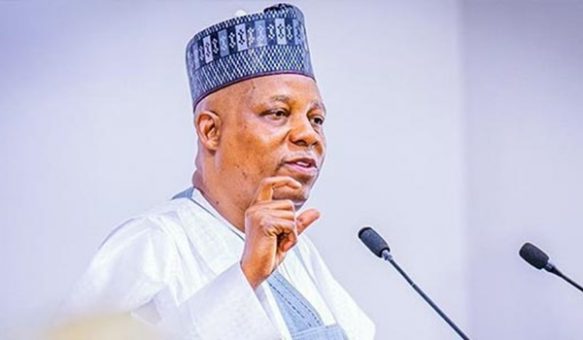Vice-President Kashim Shettima has revealed the critical factors that prompted President Bola Ahmed Tinubu to declare a state of emergency on agriculture, saying the move was driven by the urgent need to strengthen Nigeria’s food system and restore national food sovereignty.
Speaking during a high-level session titled “Country Perspectives: Government-led Strategies and Regional Frameworks” at the ongoing United Nations Food Systems Summit Stocktaking Moment in Addis Ababa, Ethiopia, Shettima emphasized that no nation can claim true sovereignty without food independence.
The session brought together African leaders and policymakers to discuss strategies for achieving sustainable, inclusive, and resilient food systems across the continent.
“We met the nation in a very difficult state of affairs,” Shettima said. “President Bola Tinubu declared a state of food emergency out of genuine concern for the welfare of our people, especially in conflict-prone areas like the North-East where insurgents continue to threaten lives and livelihoods.”
The vice-president highlighted key interventions introduced under the emergency declaration, including the establishment of the Presidential Food Systems Coordinating Units. These units are designed not to replace existing structures, but to enhance coordination for improved food delivery.
Shettima noted that the administration is working to empower internally displaced persons (IDPs) by encouraging food production within camps, fostering resilience and dignity among affected populations.
“In the Sahelian region, where economy and ecology are deeply linked, we are implementing robust policies to prevent our people from sliding into despair,” he added. “Hunger knows no bounds and doesn’t discriminate. That is why we are committed to empowering smallholder farmers, women, and youths through targeted incentives.”
He stressed that the government’s agricultural strategy is market-driven rather than dependent on handouts, with a strong focus on increasing yields, modernizing farming practices, embracing mechanisation, and improving seed quality.
“We are reinforcing our extension services so that farmers have access to real-time data, including rainfall patterns, to better manage the climate shocks affecting our region,” Shettima said.
He also commended the World Food Programme (WFP) and other multilateral agencies for their continued support in addressing food insecurity in Nigeria.
In her remarks, the Deputy Secretary-General of the United Nations, Amina Mohammed, called for a shift from short-term interventions to long-term, transformative strategies in food systems. She highlighted the alarming statistic that over 37 million children under five face acute malnutrition globally — nearly the population of Canada.
“We must move from dependency to transformation,” Mohammed said. “It is time to embed resilience into national strategies. This requires adequate financing, genuine partnerships, inclusion, and coordinated action that truly impacts lives.”
Other notable speakers included Cindy McCain, Executive Director of the World Food Programme; Salah Jama, Deputy Prime Minister of Somalia; and Moubarack Rounbo, Minister of Agricultural Production and Industrialisation, Chad.
The summit continues as African leaders deliberate on collaborative strategies to enhance food sovereignty and resilience across the continent.

Comments